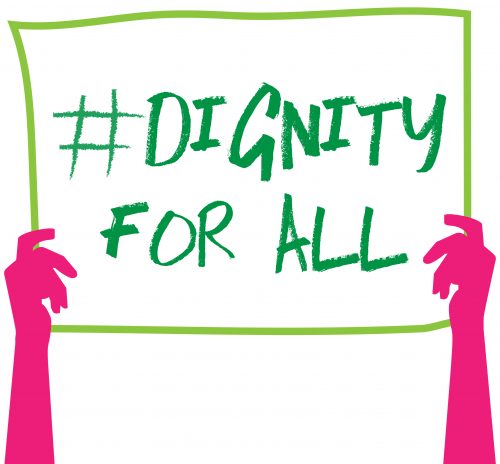“DePaul: Dignity for All” was the catchphrase of the rally. The event featured different community figures reading scripted promises of intolerance for hate, protecting human dignity, along with a list of different identities. It was quick, around 20 minutes long, and the rally raised a lot more questions than it answered. What does it mean to respect human dignity? How do we hold these people accountable for keeping these grandiose promises? Why was the only clear call to action about posting on social media with a hashtag?
Let’s consider the context to the rally. When initial news of the rally broke, it was positioned as a response to Charlottesville. In the middle of last August, there were people in the streets with tiki torches, shouting “white lives matter”. The following day, amidst arguments between protesters and counter-protesters, a man drove into the crowd with his car, killing one woman and injuring 19 others.
In addition to the white-nationalist fervor spread throughout Charlottesville and the ensuing tragedy, President Donald Trump recently announced intentions to repeal The Deferred Action for Childhood Arrivals, DACA. The landmark, Obama-era decision allows individuals who entered the United States as children, and meet a set of requirements, to defer deportation for a two-year period, which can be renewed for additional years and receive approval for employment. Qualifications for the program require individuals to have immigrated to the United States before the age of 16, to have continuously resided in the United States since 2007, and to be under the age of 31 at the time of application. With the freeze and intended removal of DACA, many people, including some DePaul students, face the threat of deportation.
With such policies and decisions that target already marginalized groups in a society filled with increasingly divisive rhetoric, we must ask ourselves that much loved Vincentian question, “What must be done?” The problem with the local rally is that it didn’t answer this question. They spoke about the power of words and how they can be a vehicle for change. Those statements had merit as a segue into a conversation about accountability, because words and promises only have power if they cause action.

But the rally didn’t quite get there. Without specificity, public promises often lead to the sort of kind-hearted complacency that only good intentions bring. Without specificity, there can be no accountability. The call for acceptance in our community falls short of a movement because there are no goals or expectations. What must be done is not to promise to do better-it’s to do better.
Doing better looks like offering resources to the people affected by the possible repeal of DACA. It looks like dropping the phrase “illegal aliens” because people, and they are people, cannot be illegal. It’s offering to explain systematic racism in class. It’s explaining to your “All Lives Matter” shouting friend the context of the Black Lives Matter movement. You don’t have to call people out in the middle of class. Call in, get a cup of coffee with someone and explain why you have issues with what they’re saying. Don’t be complacent. Don’t post #dignityforall and then forget to vote. Don’t avoid criticizing something you don’t agree with because of freedom of speech. Freedom of speech protects disagreement. Use your privileges for good. Read up on injustice. Ask yourself the big questions. What must be done? About what?
Father Dan Borlik, Priest Chaplain for Catholic Campus Ministry, was a speaker at the rally. According to Borlik, the rally was initially expected to draw a small crowd, but through word of mouth drew hundreds of attendees, including the new DePaul President, A. Gabriel Esteban, showing the support for DePaul’s founding values of inclusion and support for dreamers is alive and well among the DePaul community.
Everyone at the rally who stood in front of the crowd and promised action deserves the upmost respect. But it was disappointing. There was no description about what future action should look like and there was no talk about why this rally took place. Key political issues such as some of the things the President Trump has said, a race riot where someone died, or a policy that lets so many pursue education, or a job, were not directly mentioned. The rally did not deliver calls to action, or address what must be done or why. There were just promises that something would be done. But mostly it’s disappointing because the closing remarks were about social media selfies and a hashtag. It ended up feeling like a publicity event or a call to Facebook activism. While it’s great to promise to do good, it’s better to go out and do good.
We live in an increasingly volatile world. Threats of Nazism and increasing oppression of marginalized groups sit at the table. Last year at DePaul, the threat of violence was present at a rally like this one. Perhaps that’s why the content seemed watered down and less controversial, but that’s no reason to stop trying.
Father Borlik said, “The on-campus events of previous years, such as the speech by Milo Yiannopoulos, leaves DePaul searching for ways to be assertive, and more responsible and strong about the University’s founding values.”
DePaul must plan more rallies. Offer opportunities to people who get less than their fair share. Take your disappointments and turn them into words, into action, into change. Be ready for opposition. In the words of Maurice Saatchi, co-founder of the advertising agency Saatchi and Saatchi , “If you stand for something you will have people for you and people against you. But if you stand for nothing you will have nobody for you and nobody against you.”
Don’t just be intolerant of hate, stand up to it, stand together and spread love.

